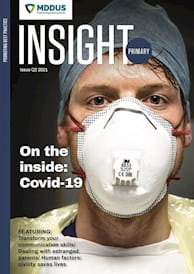IT’S not uncommon for clinicians to be asked to provide healthcare advice or treatment to a colleague. Some healthcare staff might even think of it as a potential job perk. Instead of taking time away from work to visit their own doctor they may decide it’s more convenient to approach you.
It might be tempting in the current lockdown to offer a colleague advice or a prescription to save them having to go elsewhere and risk catching or transmitting Covid.
Refusing to offer advice or treatment in this situation might feel awkward or over-scrupulous. It could seem particularly difficult if your organisation has a long-established culture where it’s seen as acceptable to prescribe the odd antibiotic or painkiller to a member of staff when the risks appear minimal.
However, MDDUS would usually advise that you ask your colleague to make an appointment with their own doctor.
Regulatory guidance
When colleagues work together day after day, for long hours and often in intense circumstances, it is not unusual for close relationships to develop. But it is important to recognise that such close personal relationships can make it more difficult for a doctor to make objective clinical decisions. The General Medical Council (GMC) is clear on the matter in its guidance Good medical practice, stating in paragraph 16g: "In providing clinical care you must... wherever possible, avoid providing medical care to yourself or anyone with whom you have a close personal relationship".
This is reiterated within the recently updated Good practice in prescribing and managing medicines and devices: "Wherever possible you must avoid prescribing for yourself or anyone with whom you have a close personal relationship."
Access to clinical records
There are other, logistical reasons for not providing treatment to colleagues. You may be approached for advice regarding a fairly straightforward issue such as UTI symptoms, or asked to perform a quick examination such as a BP check. However, in the absence of a full medical history you will be relying purely on your colleague to relay clinically relevant information. This will make it difficult to come to an informed shared decision on advice or potential treatment. There could be something in the medical records regarding the presenting complaint that your colleague thinks is not relevant or is inappropriate to disclose.
Any interaction with a patient – be it simple self-care advice or a prescription – should be noted in the patient records and this can be difficult without direct access. It is important not only for continuity of care but also has potential legal implications if evidence is required for defence in a claim or regulatory complaint.
Disputes over treatment
Dealing with patient complaints regarding alleged inadequate advice or treatment is difficult enough, but when involving a colleague this can complicate matters further and impact relationships across the team.
One example of a complaint escalating into a staff dispute involved a GP, Dr H, who was approached by a practice nurse to look at a lesion on her arm. After a quick examination, Dr H tells the nurse it doesn’t seem suspicious but gives very strong safety netting advice for her to get in touch with her own GP if it changes. Relieved, the nurse tells the receptionist how grateful she is for his advice.
However, only a few months prior, Dr H refused the receptionist’s request for advice on a skin complaint, advising her instead to see her own GP. The secretary is upset and complains that Dr H behaved differently because of her non-clinical background.
Special circumstances
Clear conflicts of interest can exist from an employment law perspective when clinicians wear two hats, one as a GP and the other as an employer. It is therefore preferable to avoid having staff members registered at the practice as patients.
There are of course scenarios where providing treatment to a colleague is warranted. These include emergency situations where delay can have severe consequences on someone’s health. A quick risk assessment should be undertaken and any necessary treatment provided to stabilise the condition.
GMC guidance states that if you do prescribe for someone close to you (which would include a member of staff), you must tell the patient’s GP (and others treating the patient, where relevant) what you have prescribed and any other information necessary for continuing care. You must have the patient’s consent to share that information.
Practising in a rural area can also limit options in finding alternative medical care – so having staff as registered patients may be sometimes unavoidable. In such circumstances you must take care to ensure that decisions on clinical treatment are not influenced in any way by business priorities, such as being reluctant to sign your patient off unfit from work knowing this would mean the practice is down a member of staff. Alternatively, a doctor who is not a partner (and so not the employer of the practice staff) could lead on providing clinical care to practice staff.
Action points
- Advise colleagues to seek advice from their own doctor where possible and practicable.
- Carry out a quick clinical risk assessment in emergency situations and provide minimal treatment required to make the patient safe until further help can be sought from their own healthcare provider.
- Ensure unavoidable clinical decisions regarding staff are not influenced by any business needs or other conflicts of interest.
- Follow regulatory guidance on treating family and close associates, as well as guidance on maintaining adequate patient records.
This page was correct at the time of publication. Any guidance is intended as general guidance for members only. If you are a member and need specific advice relating to your own circumstances, please contact one of our advisers.
Read more from this issue of Insight Primary

Save this article
Save this article to a list of favourite articles which members can access in their account.
Save to library

